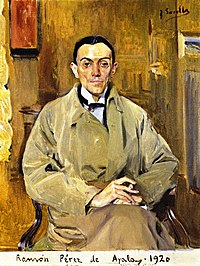Ramón Pérez de Ayala
This article includes a list of general references, but it lacks sufficient corresponding inline citations. (May 2014) |
You can help expand this article with text translated from the corresponding article in Spanish. (June 2018) Click [show] for important translation instructions.
|

Photograph by Ricardo Martín (1882-1936)

Ramón Pérez de Ayala y Fernández del Portal (9 August 1880, in Oviedo – 5 August 1962, in Madrid) was a Spanish writer. He was the Spanish ambassador to England in London (1931-1936) and voluntarily exiled himself to Argentina via France because of the Spanish Civil War (1936-1939). He was nominated for the Nobel Prize in Literature.[1]
Background
Pérez de Ayala was educated at
He was elected to the
After 1916, his novels became increasingly mature and lyrical, his characters becoming symbolic representatives of general human problems. To this period belongs his masterpieces, Belarmino y Apolonio (1921) (translated as "Belarmino and Apolonio"), Tiger Juan (1926) and El curandero de su honra (The Healer of his Honour) (1927).
La paz del sendero (The Peace of the Path) (1903), El sendero innumerable (1916), and El sendero andante (1921), his major poetic works, show the influence of French symbolism. He also wrote satiric essays and dramatic criticism.
Works available in English
- Belarmino and Apolonio (1990) Quartet Books. ISBN 0-7043-0109-1
- Honeymoon, Bittermoon (1974) University of California Press. ISBN 0-520-01727-7
- Sunday Light. In: Sáenz, Paz, ed. (1988). Narratives from the Silver Age. Translated by Hughes, Victoria; ISBN 84-87093-04-3.
- Tiger Juan translator OCLC 3253788
References
- ^ "Nomination Database". www.nobelprize.org. Retrieved 2017-04-19.
- ^ Bédé, Jean Albert (1980). Columbia Dictionary of Modern European Literature. Columbia University Press. p. 609.
- ^ Bédé, Jean Albert (1980). Columbia Dictionary of Modern European Literature. Columbia University Press. pp. 609–610.
